2025
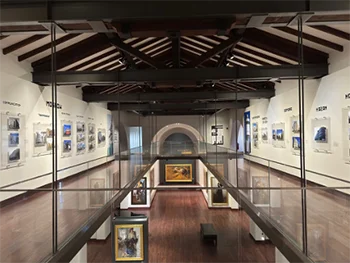
Exhibition: Avant-garde Architecture of the Soviet Era – Photography by William Brumfield at TMORA
June 14 – October 12, 2025
The Museum of Russian Art (TMORA)
The Museum of Russian Art (TMORA) presents Avant-garde Architecture of the Soviet Era: Photography by William Brumfield, on view in the Mezzanine Gallery from June 14 to October 12, 2025. Brumfield, a leading scholar of Russian architecture and an acclaimed photographer, has spent five decades building an extraordinary visual archive documenting Russia’s architectural heritage—from the avant-garde of the 1920s–1930s in Moscow to sites across the European heartland, the Urals, Siberia, and the Far East. His images, preserved in the Library of Congress and the National Gallery of Art, offer a rare and comprehensive look at Russia’s architectural treasures. TMORA honors Brumfield for his lifelong dedication to preserving and sharing this cultural legacy.
2024
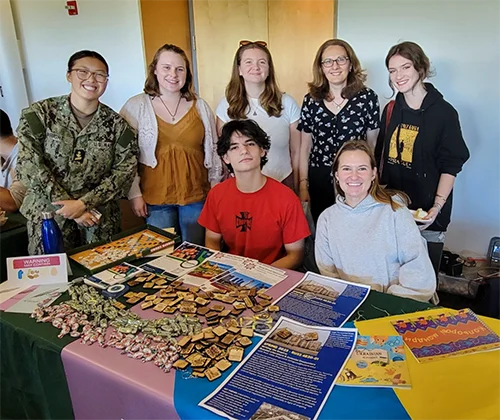
Tulane Language Day – Celebrating Languages and Cultures, 2024
On Wednesday, November 20, from 2:00 to 4:30 PM, Tulane Language Day brought the campus community together to celebrate languages, cultures, and global connections. The event featured activity tables, interactive presentations, and performances representing the wide variety of languages taught at Tulane.
The Russian Program was proudly represented by our dedicated language ambassadors, who prepared engaging activities to introduce visitors to Russian and Ukrainian languages and cultures. At the language activity table, students and guests practiced basic Russian and Ukrainian phrases, learned about the Cyrillic alphabet, explored cultural trivia, and enjoyed traditional games. The atmosphere was lively, welcoming, and inclusive, creating opportunities for meaningful cross-cultural exchange.
Tulane Language Day highlighted the vibrancy of our language programs and reinforced the importance of multilingualism in fostering understanding across borders. The Russian Program looks forward to continuing to share the richness of Slavic and Eurasian languages and cultures at future campus events.
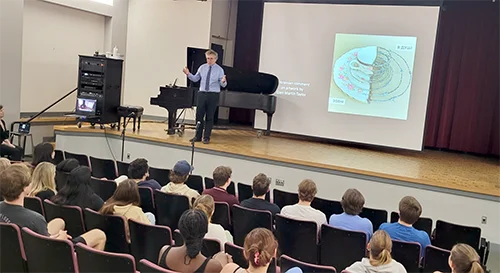
Ukrainian Pianist Taras Filenko: Music as Cultural Resistance
November 2024
In November 2024, the Russian Studies Program at Tulane hosted Ukrainian pianist and musicologist Dr. Taras Filenko for a lecture and performance that celebrated Ukraine’s rich musical heritage and explored the role of the arts in resisting oppression.
Through a program spanning Ukrainian composers from the 18th to the 21st centuries, accompanied by historical commentary and visual art, Filenko traced centuries of Russian and Soviet policies aimed at erasing Ukrainian culture. He highlighted the resilience of artists who, even when banned from performing, continued to compose works infused with national identity.
Filenko’s message—that the current war is a continuation of long-standing imperial attempts to suppress Ukraine’s language, art, and music—resonated deeply with the audience. His visit included presentations to Tulane students, performances at the Music at Midday series at Tulane, and a concert at Trinity Episcopal Church in New Orleans.
Read the full article in The Tulane Hullabaloo:
Ukrainian pianist Taras Filenko brings message of cultural resilience to Tulane
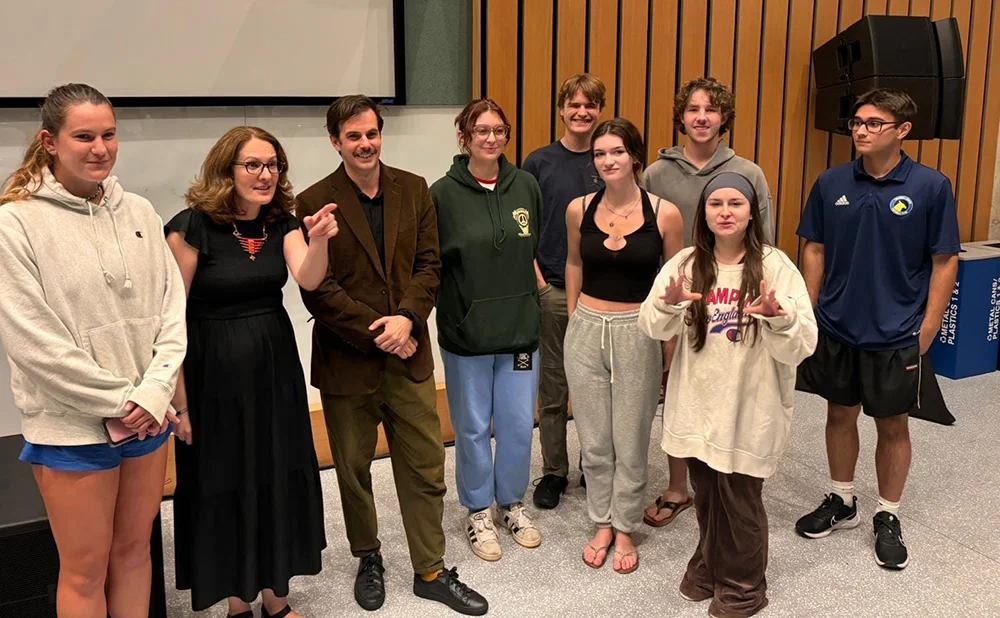
and Prof. Lidia Zhigunova at the screening of
“Master and Margarita” (2024).
Film Screening and Q&A – Master & Margarita (2024)
Thursday, November 7, 2024
The Village Theater, Lake Residence Hall
In Fall 2024, the Russian Program at Tulane University hosted an exclusive campus screening of Master & Margarita (2024)—the first public screening of the film outside of Russia. The event featured a Q&A session with director Michael Lockshin, offering students and faculty a rare opportunity to engage directly with the filmmaker behind one of the most politically charged Russian-language films in recent years.
Born in the U.S. and raised in both the United States and Russia, Lockshin studied psychology at Moscow State University before launching his directing career in London. His debut feature, Silver Skates (2019), became the first Russian-language Netflix Original and won numerous international awards. His new film, Master & Margarita, is an ambitious adaptation of Mikhail Bulgakov’s legendary novel, written under Stalin’s regime.
Released in Russia earlier that year, the film has sparked intense controversy, both for its critique of authoritarianism and censorship and for Lockshin’s anti-war, pro-Ukrainian stance. The film powerfully underscores Bulgakov’s enduring themes of state power, punitive psychiatry, and the suppression of individual freedom—issues that remain deeply relevant today.
Related Media Coverage
The screening received thoughtful coverage in The Tulane Hullabaloo by Erin Malloy, a student in the Russian language program and staff writer for the university’s independent student newspaper. In her article, “Russian film ‘The Master and Margarita’ explores Russian censorship,” Malloy reflects on the film’s powerful relevance in today’s political climate and highlights both the historical legacy of censorship in the Soviet Union and its modern-day resurgence in Putin’s Russia.
“I understood immediately why it was banned,” noted one student attendee. “The irony of a movie about Russian censorship being censored by Russia.”
Malloy contextualizes the film's release, Lockshin’s forced detachment from its Russian distribution, and the Russian government’s labeling of the project as a foreign plot. She also captures the audience’s engagement during the post-screening Q&A, where students asked questions about artistic choices, political risk, and the film’s nuanced adaptation of Bulgakov’s novel.
Read the full article in The Tulane Hullabaloo:
Russian film The Master and Margarita explores Russian censorship
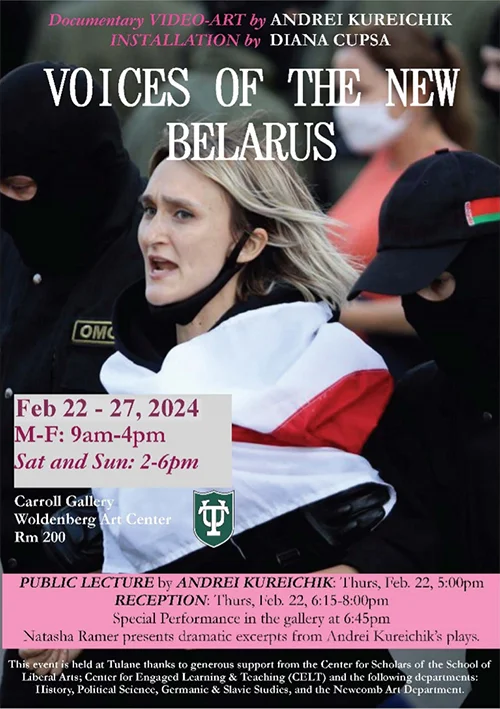
Andrei Kureichik – INSULTED. BELARUS; VOICES OF THE NEW BELARUS
February 21–28, 2024
Carroll Gallery, Tulane University
Public Lecture: February 22, 2024, 5:00–6:30 PM – Stone Auditorium
In February 2024, Tulane University welcomed Andrei Kureichik, acclaimed Belarusian playwright, theater and film director, and political activist, for the launch of his inaugural exhibition Voices of the New Belarus at the Carroll Gallery. The exhibition ran from February 21 to 28 and was accompanied by a public lecture on February 22 in Stone Auditorium, titled INSULTED. BELARUS; VOICES OF THE NEW BELARUS.
The exhibition and talk addressed the challenges of Belarusians resisting the autocratic regime of Alexander Lukashenko, with a particular focus on the plight of political detainees in post-Soviet Belarus. The show featured powerful video art installations—documentary and artistic videos, animations, and multimedia elements—depicting the courage and determination of the Belarusian people in their struggle against dictatorship. Central to the exhibition was Voices of the New Belarus, Kureichik’s documentary play composed of sixteen monologues based on the real-life testimonies of Belarusians and political prisoners targeted by Lukashenko’s repressive apparatus.
The realization of this event was made possible through the collaboration and dedication of many contributors, including Lidia Zhigunova, Director of the Russian Studies Program at Tulane University; Laura Richens, Curator of the Carroll Gallery; Diana Cupşa, Associate Professor of Scenic Design in Tulane’s Department of Theatre and Dance; and Natasha Ramer, Artistic Director at Moscow Nights Inc.
Special thanks also go to the students of RUSS 2040 in Prof. Zhigunova’s class, who assisted with the exhibition installation.
The Carroll Gallery hosted both the installation and a reception following the lecture, offering students, faculty, and members of the New Orleans community a meaningful opportunity to engage with Kureichik’s work and the urgent issues it brings to light.
2023
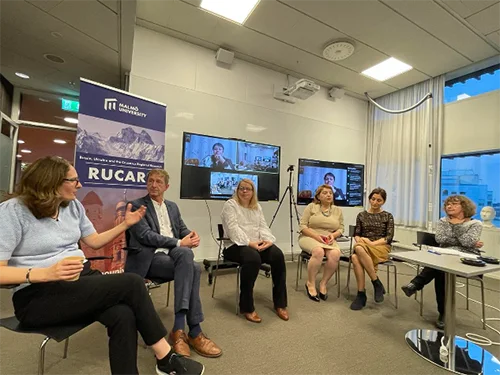
Language in Conflict and War — Ukraine, Caucasus, Russia
November 6–7, 2023
Malmö University, Sweden
In November 2023, Professor Lidia Zhigunova was invited by the Russia, Ukraine and the Caucasus Regional Research Center (RUCARR) at Malmö University, co-founded by Professor Karina Vamling (Professor of Caucasus Studies), to participate in the international symposium Language in Conflict and War.
The event brought together leading scholars to explore the role of language in contexts of conflict and war across Ukraine, the Caucasus, and Russia. Discussions examined how language functions as both a marker of identity and a tool of political struggle, touching on themes such as the politicization of Ukrainian vs. Russian in Ukraine, the historical legacy of Russian as a colonial language, the linguistic situation of ethnic minorities in occupied territories, and the impact of forced migration on language preservation.
On November 7, Professor Zhigunova presented her paper “Russia’s War on Indigenous Languages: The Case of Circassian in the North Caucasus”, analyzing how Russian wartime and colonial policies threaten the survival of the Circassian language and culture.
Other featured speakers included:
- Nadiya Kiss (Justus Liebig University, Giessen, Germany) — Languages at War: Language Shift, Contested Language Diversity, and Ambivalent Enmity in Ukraine
- Andrey Makarychev (Tartu University, Estonia) — Estonian Russophones: A Biopolitical Story
- Mariam Manjgaladze (Caucasus University, Tbilisi, Georgia) — Issues of the Official Language Ecology in Contemporary Georgia
As a direct outcome of this presentation and collaboration with the RUCARR research community, Professor Zhigunova was invited to contribute a chapter to the forthcoming edited volume Languages in Conflict and War (Palgrave Macmillan: Palgrave Studies in Languages at War, 2025), edited by Karina Vamling, Bo Petersson, Nadiya Kiss, and Liudmyla Pidkuimukha. Her chapter, titled “Surviving Suppression: Circassian Language Preservation in Russia and the Diaspora,” examines strategies for maintaining linguistic and cultural identity under conditions of state pressure and diaspora dispersal.
For more information, please visit the Russia, Ukraine and the Caucasus Regional Research (RUCARR) website.
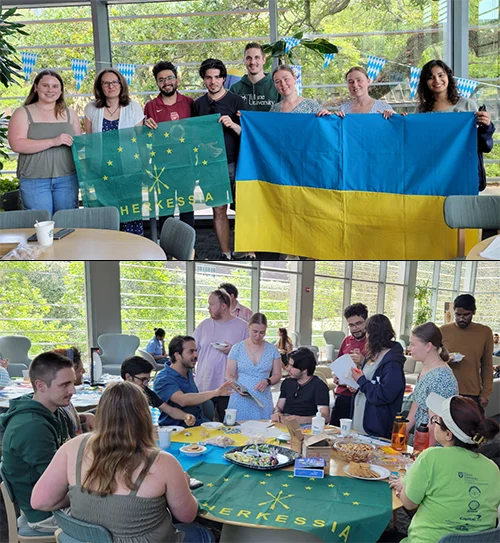
Global Café: Germanic & Slavic Studies
Tuesday, October 17, 2023 2:00-4:00pm
LBC: Mezzanine Level
Dive into the World of Germanic and Slavic Studies at Global Café! Join us for a captivating afternoon as we explore the rich tapestry of cultures in Germanic and Slavic Studies. Discover the fascinating culture, languages, and traditions that make this region unique. Test your knowledge with fun trivia games, get the scoop on exciting study abroad opportunities, and enjoy board games that transport you to these vibrant cultures, plus exclusive insights into upcoming Ukraine events. We hope to see you there!
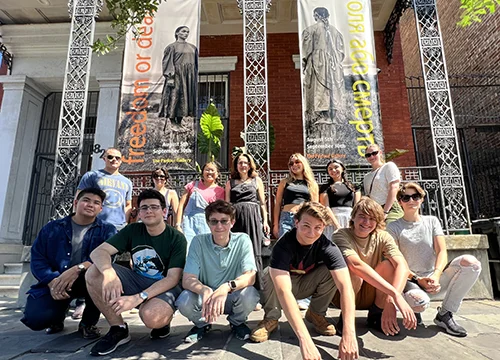
Tulane Russian Program Students Visit Ukrainian Photography Exhibit Freedom or Death
September 2023
Parlour Gallery, New Orleans
In September 2023, students in the Russian Program at Tulane University, led by Prof. Lidia Zhigunova, visited the Freedom or Death / Воля або Смерть: Welcome to Ukraine exhibition at the Parlour Gallery in New Orleans.
The show, curated by Sasha Theodora, featured powerful lens-based works by five Ukrainian artists: Sasha Theodora, Arsenii Gerasymenko, Pavlo Dorohoi, Oleksii Furman, and Bohdan Poshyvailo.
Through the photographers’ distinct yet interconnected perspectives, the exhibition offered a moving portrayal of Ukraine’s ongoing struggle for freedom and dignity in the face of Russian aggression. More than a documentation of war, the exhibit contextualized Ukraine’s centuries-long resistance to imperial domination and sought to decolonize narratives around Ukrainian identity and culture.
This visit sparked meaningful discussion among students about art, resistance, and cultural memory—key themes explored in the Russian Program’s curriculum.
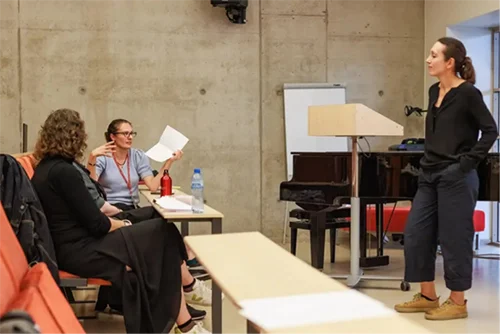
From the Caucasus to the Baltics: Disentangling Eurasia in Estonia
By Lidia Zhigunova
In July 2023, I was awarded a Lavin Bernick Grant for Faculty Research and Development, which enabled me to participate in the Third Tallinn Summer School titled Disentangling Eurasia: Russian Empire, the Soviet Union, and Their Successors, held at Tallinn University (Estonia) from July 28 to August 4, 2023.
The Summer School brought together leading scholars and Ph.D. students of Soviet and post-Soviet history, society, and culture to critically reassess the fundamentals of the field. Workshops and lectures expanded the focus beyond the 20th century and outside the boundaries of today’s Russian Federation, incorporating perspectives from Ukraine, the Baltics, the Caucasus, and Central Asia. A key goal was to challenge lingering Russo-centrism in academia.
The program opened with the roundtable “Decolonizing Soviet Studies – What Does It Mean?” addressing one of the most pressing topics in Eastern European Studies today: how successor states of the Soviet Union confront or redefine their Soviet past. Discussions highlighted the continuing relevance of Soviet history for understanding contemporary Russia, particularly the revival of Soviet-era structures, narratives, and social practices.
Connecting past and present, participants explored, among other topics, the evolution of homo sovieticus into homo militaris - a mindset characterized by conspiratorial thinking and the glorification of military power. Shaped by sustained indoctrination, this transformation underpins a pervasive “war-readiness” in contemporary Russian society.
The week-long program provided a valuable space to workshop ideas and strengthen collaborative research networks.
The knowledge and perspectives gained in Tallinn were integrated into all my Fall 2023 and Spring 2024 courses and inspired the design of a new Special Topic course taught in Fall 2024:
RUSS 4820 – Disentangling Eurasia: Identity & Conflict in the Post-Soviet Space
This course examines key social and political trends shaping the post-Soviet era through literature, art, film, and historical documents. We explore the dynamics between Russia and the five major post-Soviet regions—the Baltics, the Caucasus (North and South), Ukraine, Belarus, and Central Asia—with a focus on how and why ethnicity becomes politicized. Students engage with cases of nationalist mobilization, secessionism, and ethnic conflict that emerged in the late Soviet period and continue to shape contemporary politics.
The Memorial to Estonia’s Victims of Communism is a powerful site of remembrance, consisting of two symbolic parts: The Journey and The Home Garden.
The Journey represents the path of those who were deported, imprisoned, or perished under Soviet repression, evoking the hardship, loss, and resilience of the Estonian people. The Home Garden symbolizes the return—both real and imagined—of those who survived, and the enduring vitality of the nation.
A central metaphor is that of the bee. Bees always stick together; many are lost along the way, but some make it back to the hive, where they cultivate and protect the garden. This imagery draws from the beloved poem “It Flies Toward the Beehive” (Ta lendab mesipuu poole) by Juhan Liiv (1905), later set to music and embraced as an unofficial song of resilience and unity for the Estonian people. For generations, it has carried the hope that, despite the devastation of exile and oppression, the community will return, rebuild, and thrive together.
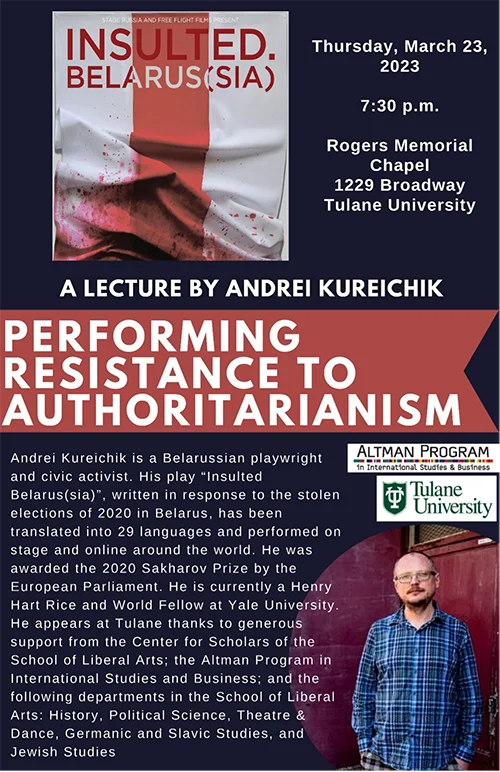
Performing Resistance to Authoritarianism: A Lecture by Andrei Kureichik
March 23, 2023
Rogers Memorial Chapel, Tulane University
The public talk addresses the challenges of Belarusians' resistance to the autocratic regime of Alexander Lukashenko and the dire situation of political detainees in post-Soviet Belarus.
Andrei Kureichik, Henry Hart Rice Associate Research Scholar and Lecturer, Yale World Fellow (2022), and Fortunoff Fellow (2023), is a Belarusian playwright, director, publicist, and civic activist. Before 2020, Kureichik was especially celebrated for his comedies and suspense thrillers, which enjoyed wide popularity in Belarus.
Following the contested presidential elections and violent crackdown in Belarus in August 2020, he emerged as an internationally recognized political playwright. As a member of the Coordination Council working with Sviatlana Tsikhanouskaya’s transition team, Kureichik was forced into exile. In response to the events in Belarus, he channeled his creative energy into the documentary play Insulted. Belarus(sia)—a searing portrayal of the 2020 presidential election, the ensuing protests, and the state-led repression under Alexander Lukashenko’s regime.
The play has been translated into 29 languages and has received more than 200 readings and performances worldwide. It has been featured in Plays International & Europe, Contemporary Theatre Review, The Boston Globe, Dialog, and Theatre Journal.
As a member of the Belarusian Coordination Council, Kureichik and his colleagues were awarded the 2020 Sakharov Prize for Freedom of Thought by the European Parliament.
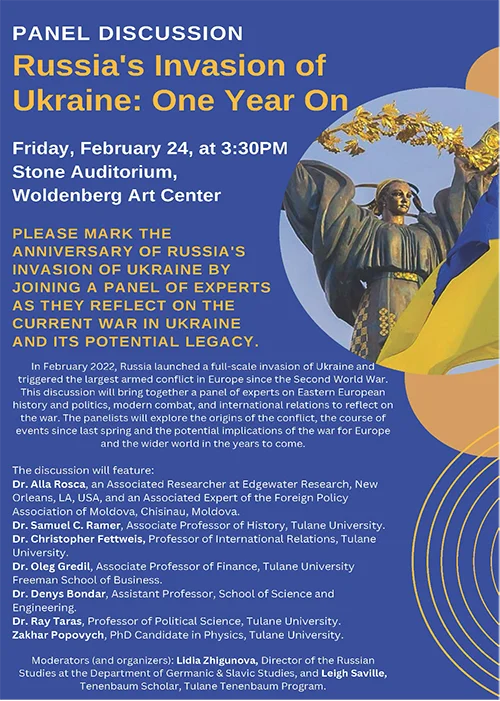
Panel Discussion – The War in Ukraine: One Year On
February 24, 2023
Stone Auditorium, Woldenberg Art Center
On the first anniversary of Russia’s full-scale invasion of Ukraine, the Russian Studies Program hosted a multidisciplinary panel discussion examining the war’s origins, trajectory, and potential long-term impact on Europe and the wider world.
The event brought together experts in Eastern European history and politics, modern warfare, international relations, and economics, including Dr. Alla Rosca, Dr. Samuel C. Ramer, Dr. Christopher Fettweis, Dr. Oleg Gredil, Dr. Denys Bondar, Dr. Ray Taras, and Zakhar Popovych.
Moderated by Lidia Zhigunova, Director of Russian Studies, and Leigh Saville, Tenenbaum Scholar, the discussion offered diverse perspectives on the conflict, highlighting its historical roots, geopolitical stakes, and the resilience of Ukraine in the face of unprecedented challenges.
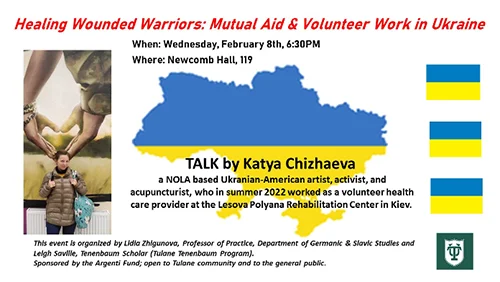
Healing Wounded Warriors: Mutual Aid and Volunteer Work in Ukraine
February 8, 2023
Newcomb Hall, 119, Tulane University
The Russian Studies Program hosted Katya Chizhaeva, a New Orleans–based Ukrainian American artist, activist, and acupuncturist, for a talk on her volunteer work in Ukraine during the summer of 2022. Chizhaeva shared her experiences as a health care provider at the Lesova Polyana Rehabilitation Center in Kyiv, where she supported wounded soldiers recovering from injuries sustained on the front lines.
Her presentation highlighted the vital role of grassroots mutual aid networks in Ukraine’s war effort, the resilience of communities under siege, and the power of volunteerism in times of crisis.
The event was organized by Lidia Zhigunova, Director of the Russian Studies Program, and Leigh Saville, Tenenbaum Scholar with the Tulane Tenenbaum Program for undergraduate students.
2022
The Russian Invasion of Ukraine: A View from a Post-Soviet Borderland
Wednesday, April 6, 2022
Dinwiddie Hall, Room 10
In April 2022, European Horizons at Tulane hosted a public talk by Dr. Lidia Zhigunova, titled “The Russian Invasion of Ukraine: A View from a Post-Soviet Borderland.” The event examined the invasion not as an isolated event, but as part of a long-standing imperial pattern in Russian history.
Dr. Zhigunova explored the ideological and historical foundations behind Putin’s justification for war, including his recurring rhetoric questioning the sovereignty of former Soviet republics and his attempts to restore the narrative of Imperial Russia. Her talk highlighted the broader implications of Russian expansionism—particularly its impact on non-Russian ethnic groups within and beyond Russia’s borders.
Drawing parallels between present-day Ukraine and historical cases like the Russo-Circassian War (1763–1864), Dr. Zhigunova underscored the enduring legacy of colonial violence in the post-Soviet space. The Circassian case, in which over 90% of the population was either killed or exiled, serves as a stark reminder of the costs of Russian imperial ambitions—and a warning of what could be at stake for Ukraine.
The discussion raised urgent questions: Is Ukraine facing a similar erasure? Can Putin’s imperial vision be challenged? And how does the framing of history shape contemporary conflict?
2019
Water Logics International Conference
Lidia Zhigunova, Professor of Practice in the Department of Germanic & Slavic Studies, presented her paper “The Children of Whose Turbaned Seas: The Black Sea in the Historical Memory of the Circassians” at the Water Logics International Conference (April 11–12, Tulane University, 2019). The title references a line from an Emily Dickinson poem that evokes the Circassians, serving as a point of departure for examining the Black Sea’s place in Circassian historical memory, diaspora identity, and narratives of displacement. Zhigunova’s talk situated these themes within broader historical and cultural contexts.
Talk at the Georgian Foundation for Strategic and International Studies
Lidia Zhigunova, Professor of Practice in the Department of Germanic & Slavic Studies, delivered a lecture on gender issues and nationalist movements in the North Caucasus at the Georgian Foundation for Strategic and International Studies (GFSIS, Rondeli Foundation) in Tbilisi, Georgia (November 2019).
GFSIS is one of the Caucasus’s leading research and policy institutions, fostering interdisciplinary dialogue among experts on political, social, and economic processes in Georgia and the wider region. By convening scholars engaged in fieldwork and policy analysis, the Foundation promotes awareness of the strategic challenges facing the Caucasus in the 21st century and provides a vital forum for regional cooperation and interethnic dialogue.

